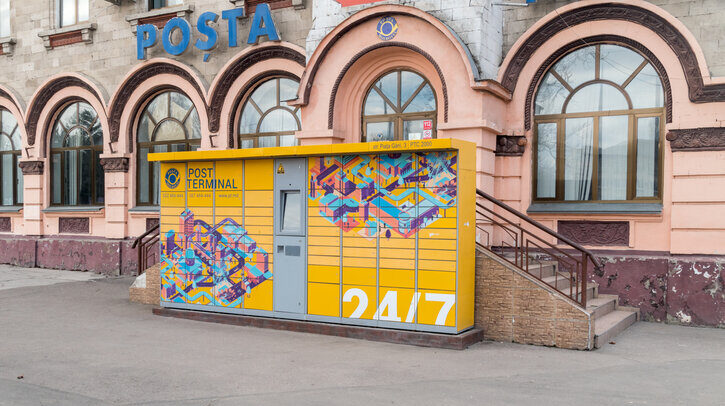Moldova – a small yet strategically positioned country in Eastern Europe – is currently undergoing a quiet revolution in logistics. The country’s somewhat traditional logistics market is transforming into an increasingly technologically-driven ecosystem, fueled by the rapid development of automated parcel machines (APMs) and pick-up and drop-off (PUDO) points. The primary catalyst of change is the growing e-commerce sector, generating ever more demand for fast and convenient delivery options.
Today, Moldova hosts both local and international players in its logistics market. These include Poșta Moldovei (national postal operator), Nova Post, UPS, DHL and Fan Courier. Although each of these companies contributes to the development of Moldova’s logistics sector, the greatest impact on its transformation comes from two players – Poșta Moldovei and Nova Post. Both operators are investing in the development of APMs, while Nova Post is also focusing on the expansion of its PUDO network, which it believes optimizes the delivery process.
Growing e-commerce market
The expansion of APMs and PUDO points is a crucial and logical development as the logistics market grows in tandem with e-commerce demand. Nova Post reported nearly 4,000,000 shipments in 2024, representing a 237% increase compared to 2023. This surge is largely attributed to the rising popularity of international e-commerce platforms like Temu, Joom, AliExpress, iHerb, Zapatos and Makeup among Moldovan consumers. Cross-border deliveries remain a core focus of the business, with parcels flowing into Moldova from China, the USA, Ukraine and Romania. Interestingly, PUDO is still primarily used for pick up rather than drop off, though this may change over time.
According to Serhii Shapran, CEO of Nova Post in Moldova, “In 2024, 695,000 customers used the services of Nova Post, a significant increase from 424,000 in 2023. This growth is expected to continue in the future. That’s why our goal is to bring delivery services closer to people, ensure step-by-step accessibility and make logistics seamless.”
Network integration
At the same time, and as the geopolitical climate in the country changes, key CEP players are actively working on further network integration with Western Europe. The Nova Post network in Moldova now includes 31 branches, 260 APMs, 61 PUDO points and three sorting hubs across the country. These numbers illustrate a clear trend: consumers increasingly seek flexible and efficient solutions, and logistics operators are meeting this demand with innovative approaches like PUDO points and parcel lockers.
“APMs and PUDO points allow customers to pick up their parcels at their convenience, which is particularly important for those living in rural areas or facing challenges accessing traditional courier services. This is not just a solution for urban dwellers but also for rural communities, where traditional courier services are often unavailable or inconvenient,” explains Shapran.
In addition to enhancing convenience for customers, integrating APMs and PUDO helps reduce carbon emissions by cutting down the number of delivery vehicles on the road and optimizing last-mile logistics. With the surging demand for fast and convenient delivery, continued development in Moldova’s logistics market is anticipated; in particular, further expansion of APM and PUDO networks and even more automated processes.
European expansion
The logistics and CEP sector in Moldova is undergoing a dynamic transformation, with PUDO points and parcel lockers becoming essential components of daily life for Moldovans. Notably, Moldova’s potential accession to the European Union could act as a catalyst for even more profound changes, including regulatory alignment, modernization of infrastructure and increased foreign investment.
These advancements would drive a significant boost in cross-border trade, seamlessly connecting Moldova to broader European markets. Such progress would unlock new opportunities to elevate service quality, enhance delivery convenience for end users and fuel the rapid growth of e-commerce across the region.


